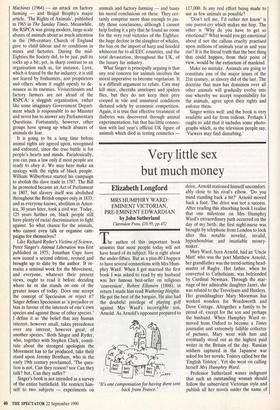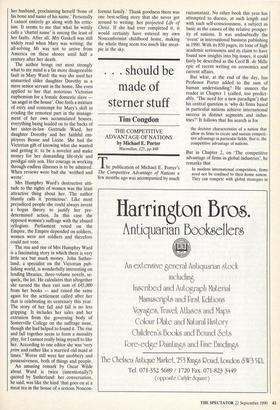Very little sex but much money
Elizabeth Longford
MRS HUMPHRY WARD: EMINENT VICTORIAN, PRE-EMINENT EDWARDIAN by John Sutherland Clarendon Press, £16.95, pp.432 The author of this important book assumes that most people today will not have heard of its subject. He is right about the under-fifties. But as a plus-80 I happen to have several connections with Mrs Hum- phry Ward. When I got married the first book I was asked to read by my husband was her famous best-seller on religious 'conversion', Robert Ellsmere (1888); in return I made him read Wuthering Heights. He got the best of the bargain. He also had the doubtful privilege of playing golf against Mrs Ward's incorrigible son, Arnold. As Arnold's opponent prepared to 'It's one compensation for having them sent back from France.' drive, Arnold stationed himself uncomfort- ably close to his rival's elbow. 'Do you mind standing back a bit?' Arnold moved back a foot. The drive was not a success. After reading this absorbing book I realise that one milestone on Mrs Humphry Ward's extraordinary path occurred on the day of my birth: the first night-nurse was brought by telephone from London to look after this notable novelist, invalid, hypochondriac and insatiable money- maker.
Mary Ward, born Arnold, had an 'Uncle Matt' who was the poet Matthew Arnold; her grandfather was the trend-setting head- master of Rugby. Her father, when he converted to Catholicism, was befriended by Cardinal Newman. Through the mar- riage of her admirable daughter Janet, she was related to the Trevelyans and Huxleys. Her granddaughter Mary Moorman has worked wonders for Wordsworth and Dove Cottage. Altogether a family to be proud of, except for the son and perhaps the husband. When Humphry Ward re- moved from Oxford to become a Times journalist and extremely fallible collector of pictures, Mary went with him and eventually stood out as the highest paid writer in the Britain of the day. Russian soldiers captured in the Japanese war asked for her novels; Toistoy called her the 'English Tolstoy'. Yet she went on calling herself Mrs Humphry Ward.
Professor Sutherland waxes indignant that such an outstanding woman should follow the subservient Victorian style and publish all her novels under the name of her husband, proclaiming herself 'bone of his bone and name of his name.' Personally I cannot entirely go along with his critic- ism. It seems to me that what he wittily calls a 'chattel name' is among the least of her faults. After all, Mrs Gaskell was still widely read when Mary was writing; the all-solving Ms was not to arrive from America on these shores until half a century after her death.
The author brings out most strongly what to my mind is a far more disagreeable fault in Mary Ward: the way she used her unmarried elder daughter Dorothy as a mere senior servant in the home. She even applied to her that notorious Victorian euphemism for a female domestic slave — 'an angel in the house'. One feels a mixture of envy and contempt for Mary's skill in evading the remotest part in the manage- ment of her own accumulated houses, everything being loaded on to the backs of her sister-in-law Gertrude Ward, her daughter Dorothy and her faithful em- ployees Bessie and Lizzie. She had the Victorian gift of knowing what she wanted and getting it: to be a novelist and make money for her demanding life-style and prodigal only son. Her courage in working through endless illnesses is to be admired. When reviews were bad she 'writhed and wrote'.
Mrs Humphry Ward's destructive atti- tude to the rights of women was the least attractive thing about her. The author bluntly calls it 'pernicious'. Like most prejudiced people she could always invent a bogus theory to justify her pre- determined action. In this case she opposed women's suffrage with the absurd syllogism: Parliament voted on the Empire, the Empire depended on soldiers, women were not soldiers and therefore could not vote.
The rise and rise of Mrs Humphry Ward is a fascinating story in which there is very little sex but much money. John Suther- land, a specialist on the Victorian pub- lishing world, is wonderfully interesting on lending libraries, three-volume novels, se- quels, the lot. He calculates that altogether she earned the then vast sum of £45,000 from her books — and raised the same again for the settlement called after her that is celebrating its centenary this year.
The story of her fall and fall is no less gripping. It includes her sales and her extrusion from the governing body of Somerville College on the suffrage issue, though she had helped to found it. The rise and fall together seem to form a morality play, for I cannot really bring myself to like her. According to one editor she was 'very
prim and rather like a married old maid at
times.' Worse still were her snobbery and possessiveness, both of things and people. An amusing remark by Oscar Wilde about Ward is twice (intentionally?) quoted by Sutherland: her conversation, he said, was like the kind 'that goes on at a meat tea in the house of a serious Noncon-
formist family.' Thank goodness there was one best-selling story that she never got around to writing: her projected Life of Christ. If she had ever completed it, it would certainly have entered my own Nonconformist childhood home, making the whole thing seem too much like meat- pie in the sky.



































































 Previous page
Previous page